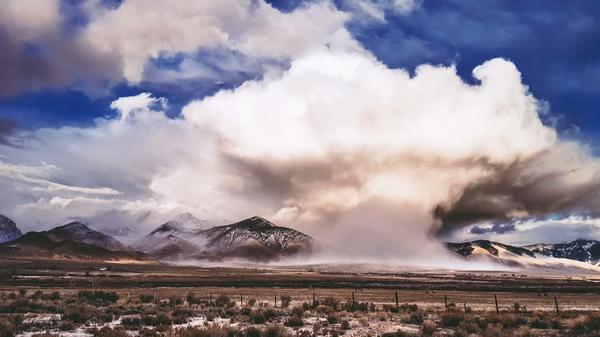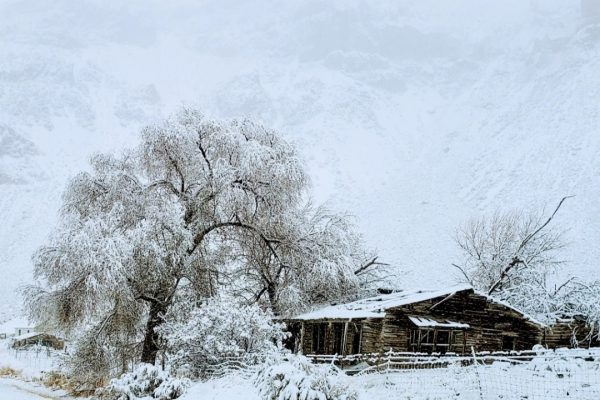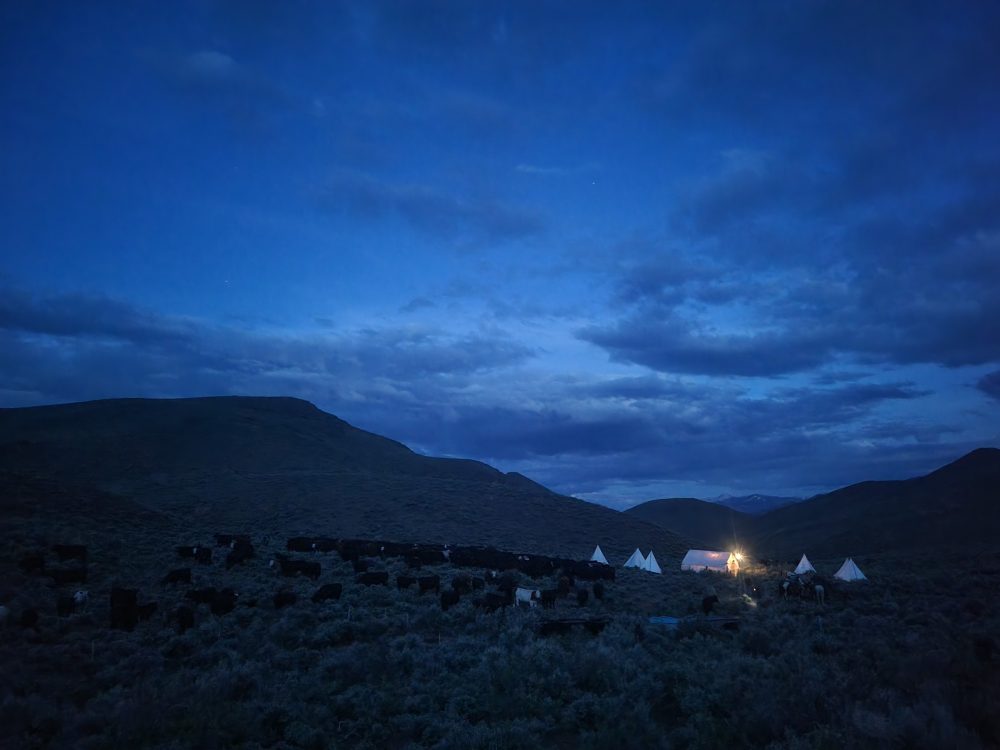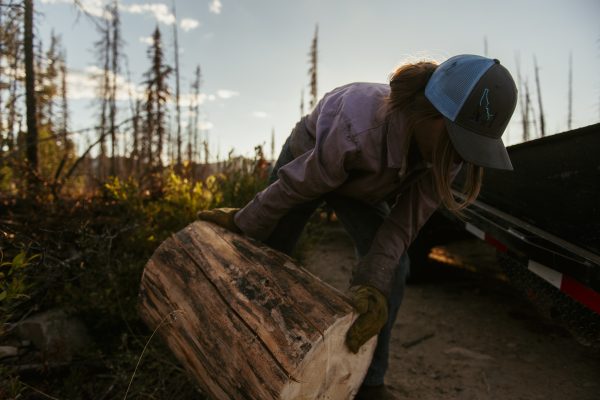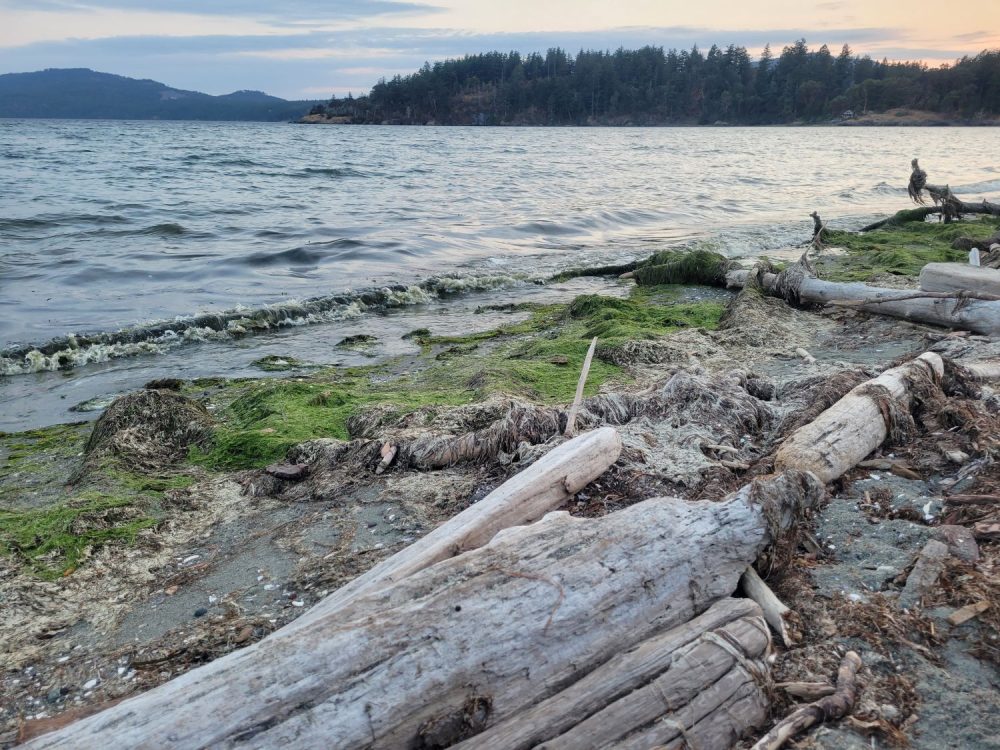A five hundred-foot pillar of cloud marked our progress on the otherwise monochrome of rolling sage that cloaked the expansive flats at the base of the mountains. The Pahsimeroi is sometimes called the “Big Valley†by local residents with good reason; it is a gently tilted valley up to 15 miles wide and over fifty in length. At the edges, the plain abruptly ends, and the land rises into a wall of glaciated peaks reaching over two miles in height. Our four hundred beeves on the hoof were sending up a column of dust skyward. It was mid-October, and the heat of high mountain summer had cooked the moisture out of the low elevation slopes of the Pahsimeroi Valley bottom.
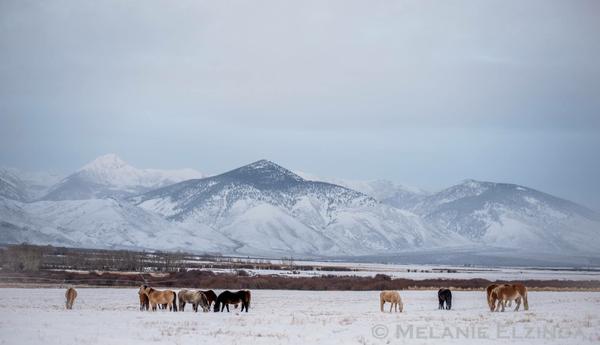
It was the yearly fall migration that marked the end of a grazing summer. Over the past few weeks, we had gathered, on horseback, over 200 cow calf pairs (the term for a cow with a calf by her side) from hill and hollow scattered across the 70 square miles of Hat Creek wilderness and staging them on our Little Hat Ranch for the final leg home. The wild elk had already started their own descent in elevation; we were simply following their lead. In just the past seven days, most of our mothers and their half-year old calves had logged in over 60 miles on foot. Winter was slowly moving downhill from the high country, leaving a mantle of deep snow over where the cows had grazed just a month ago. It was time to come home.
Some of the cows followed ancient instincts on their own; they began leaking out of the range earlier in the season, and spattering across the tapestry of lower elevation creeks and canyons. They showed up wherever gravity sent them down to lower elevation neighboring ranches, some over an hour away by pickup pulling stock trailer. And we would get phone calls.
“Hey Glenn, this is Ben O’Neal. We got 7 pair with your tags on them in the corral up at Morgan Creek Summit.â€
Or, I would call them. We would usually trail any neighbor’s cattle we found down to our pole corrals at Little Hat Ranch, and if our trailer was empty, we’d bring them on out and deliver them to where they belonged. There are only about 250 humans and 12,000 cattle in our valley, and in a few years, you get to know people who live here, and where to put their cattle.
Gathering strays is was what is called “neighborin’†around these parts. Neighbors just looked out for neighbors. So we worked together when the quaking aspen glades along the creeks started to turn gold and the air smelled like snow.
Today was the longest day for us and the beeves, the final leg of the trip from wild ranges to valley bottom headquarters. The day had gone well enough, but we were looking at a sun getting ready to plunge below that horizon. And those calves were getting tired.
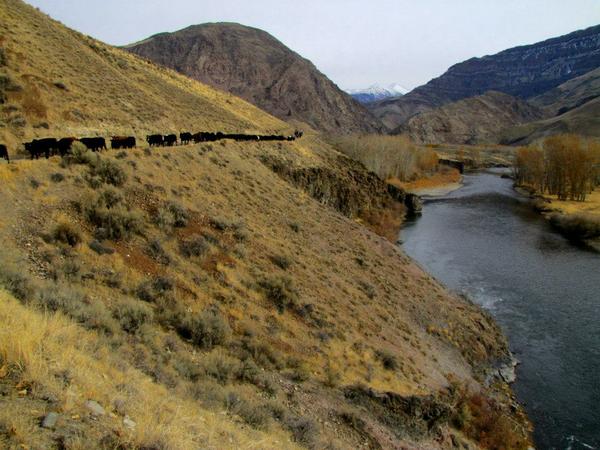
I had cowhand Josiah, and daughters Melanie and Abigail on this one. The girls were 13 and 14, and I knew that they were exhausted from the several long days on horseback gathering cattle. Josiah, as usual was stoic. I’d tried to find his grit limit for four years, and I had yet to discover it. Over that time, we’d ridden countless miles horseback together, returned long after midnight on many occasions, labored hard through the night clear through to daylight on ranch projects that needed done, and froze in the cold and burned in the sun to pure and simple numbness through it all. His favorite saying: “What doesn’t kill you makes you stronger.â€
Now, as the sun balanced on the ridge of the Pahsimeroi Range, a wind was kicking up. It wasn’t a lot; the dry grasses barely shook in it. But the breeze was the edge of a front. Frigid northern air was moving in and the temperature was dropping fast. We turned around a corner in the unending barb wire we’d been tracking for several miles and found the road that would take us home. It was straight southwest now, and I saw that the kid’s faces were filled with golden light of the low sun. I also noted red on their cheeks and blue on their lips as we struck out in these last miles. My cowhands were getting cold. Dark would come on quickly once the late fall sun set.
There was no quitting, and my crew knew it. The cows couldn’t be just left somewhere. They could wander 20 miles overnight; come hell or high water, they needed to get home. And the girls, though young, knew from experience that whining didn’t make it go any different. So they just shut up and did their job.
And as we turned the corner onto our stretch of road, there was a change in the herd. The cows knew; they remembered. And though they too were tired, they quit dragging their butts and kicked it up a notch, lifting their noses, stretching their necks toward the scent of the ranch. They knew deep fall grass, sweet and verdant awaited them after their half year away from home; they looked back as they trotted, bellering, touching noses with their young, beckoning them to follow. Those mamas had watched their calves every step over miles and miles of broken wilderness, and they cajoled them once more to come along.
We could see our ranch horses now, down the road a piece, gathered, watching us come with cattle on horseback. My Ginger freshened up with the sundown chill air slipping from the tops of the icy peaks and her friends in view. She launched into a brisk trot, and was hard to quiet. She could get excited, this one, and occasionally would get her own mind, especially if there was a job to do.
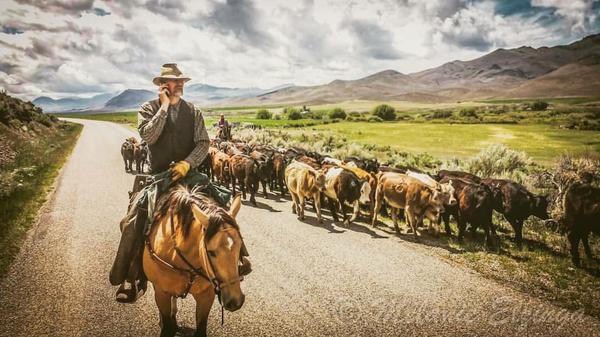
I pulled her head around in a circle as she tried to head off to her herd mates. There were fifteen other horses in the pasture where we were heading; one of us would have to keep them in as the others drifted the 400 head of bovines past them. I turned my mare toward the pasture and the gate; as I was the closest, it would be me.
I let her have head and quietly loped the last quarter mile down to the pasture gate.
When I arrived at the big metal gate, It was dusk and getting a little harder to see. The inside horses trotted down to be with Ginger as we opened it. I would push it wide open when the cattle arrived, and stand in the gap astride Ginger as I let the 200 pairs in while keeping the horses from slipping out.
In a few minutes, I could hear the padding of the cows approaching. They were a little ghost-like coming up in the gray half-light. I heard them long before I could see them, but finally I could make them out 200 feet away as they trotted up, lustily eyeing the green grass that they could scent in the field beyond me. I swung the gate wide open, and in another step swung a leg over Ginger’s back, and positioned us in place of the gate, using her body as a barrier in line with the fence as the cows came close in. It was obvious that the horses wanted out; the cows wanted in. I moved Ginger back and forth, keeping each side at bay, until enough of the cows were waiting at the opening that the flood of them would keep the horses back.
Or so I hoped; it worked before.
I sidestepped into the pasture, and the cow flood responded. It was like draining a bathtub; the tide of Black Angus poured as if with pressure through the opening left by Ginger and I. And for a moment, the horses stepped back.
And then, one particularly smart ass little black gelding found a way along the edge of the flow, and worked the eddy along the gate post. It was all it took. All 15 of them pushed through the same weak spot, despite my efforts at standing my mare in the way. They simply shoved us aside with the strength of movement over my stationary position.
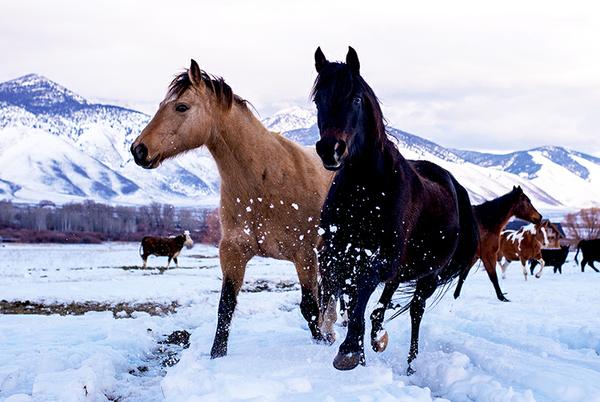
Once through, the horses clipped down the road opposite from where the cows were coming from. And then, they turned, running up an old lane toward an abandoned ranch. My heart sank.
Once they got on the lane, they came uncorked. I could see their shapes pick up speed, and hear their hoofbeats ratchet up in rhythm. Soon, they were racing in freedom, whinnying with the sheer joy of getting out, going nowhere with an idiotic glee, thundering down the lane. They vanished quickly in the charcoal gray of the onset of darkness. But here was the problem: they were going full gallop unknowing into a mess; there were cellar holes, abandoned wells, down fences, and barbed wire fragments everywhere. Huge piles of rubbish were scattered around.
I’d been around horses who galloped, loose and alone in the dark on unfamiliar places. Horrible memories leapt into my mind from when a beautiful set of colts my neighbor, Steve Shiner owned, broke and ran across a newly subdivided 40 acres between us. The 40 acre guy, an urbanite from the West Coast, had just stung up a fence with 6 strands of high tensile wire. The stuff was bombproof, but invisible.
Steve’s 12 lovely colts likely were going about 30 miles an hour on a black night and collectively ran smack dab into the wires. Early the next morning, as I was out doing my chores, they uncharacteristically followed me on the other side of our wooden boundary fence, hoping, I think, that I would see them. And I did.
They were still shaking as I approached, and a little skittish, but they let me walk among them, as they seemed to know that they desperately needed help.
Their flesh hung in bloody flaps like tattered clothing in the wind from their necks and chests. Many of the cuts exposed 6 inch cuts of raw muscle, still profusely dripping blood. They stood their ground silently and nervously shaking, as I quickly surveyed the damages. Then, I ran back to the cabin, and called Steve.
Thankfully he was at home; this was before the cell phone era. He could have been anywhere. Like us, the Shiners run cattle on big country, and could be gone for long days at a time. In a half an hour, Steve and family showed up and loaded up those poor colts. The Shiners were and still are true horsemen, and those colts couldn’t be in better hands.
Several years later, I bumped into Steve Shiner at the draft horse show at the Lemhi County Fair. The Shiner Ranch was competing in the draft driving competition, as were we. They had a lovely buckboard freight wagon that they restored for their part in the show; as I stood admiring it, we visited.
“How’d those colts ever do, Steve, that got cut up by that wire?â€
He looked up from the rigging he was working on at his wagon hitch. Steve had his usual well-worn black cowboy hat on, and had a twinkle in his eye over a droopy mustache he had ever since I’d known him. “Them colts all healed up, Glenn. Hardly a scar on them. And they were sound. Not a problem with any of them.†He grinned. “Sure glad you caught on to them right away.â€
The film of that memory played through my mind on high speed, and I knew what I had to do. I yelled off to the kids about what was happening even though I couldn’t see them. As I moved Ginger onto the road, I saw the outline of Melanie pull from the mob of black cattle to come with me. She was on Pumba, the Quarter horse thoroughbred cross.
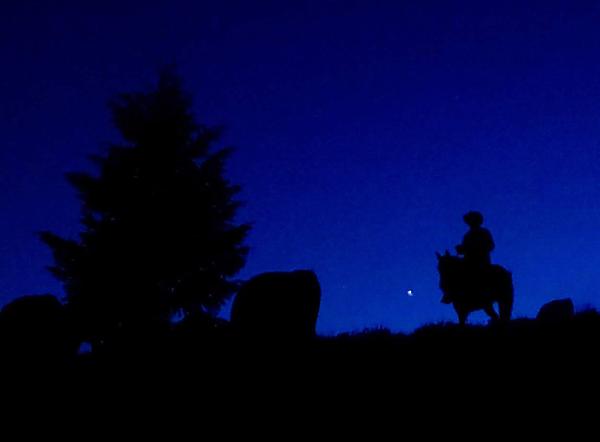
He could run, and already at that age she could really ride.
My buckskin mare, Ginger was cut from the same cloth. She had long legs and powerful hindquarters. I didn’t have time to think; as Melanie caught up to me I yelled to her about what we needed to do: “Try cutting them off and bringing them in a big circle! We gotta stop them running blindly into the end of that field after the homestead; they’ll go right into that barb wire!â€
And we were off. I couldn’t see anything further than 75 feet in front of us; I don’t think Ginger could either. It was all fun and games for her; it was a race, after all, and she could catch up to her friends. At this point, all I needed to do was hang on, and try, just try to keep her out of the big hazards. I knew where they were; there was a clear map in my head where it all was, and I could tell by faint landmarks where we were on the old ranch. I leaned forward like a jockey and tried to guide her as best as I could.
I only hoped that the runners ahead of us steered clear of all the old buildings and junk in the brush. It was too late to turn them from those; at this point, I just wanted them to stop or at least turn before they hit the wire.
Ginger had nothing, no controlling piece of metal in her mouth. She was bitless. I had a hackamore on her, fitted with a bosal, which was just a loop of braided rawhide that went around her nose about 5 inches above her nostrils. And my reins were just two pieces of soft cotton rope that came off the bottom of the bosal. Her neck was stretched out in a full gallop. There was no pulling up her head for a responsive stop, as with a bit. I could manage a slow arc with a side pull, but nothing else.
I’d heard old cowboys say of such runs where they survived to tell about it: “We was a’ hellin’!â€
And we were. Things were happening too fast to feel fear. We were running pretty blind on reflex and impulse.
In seconds that seemed like a minutes, we caught up to the mob of runners. Finally close enough to see them, we ran with them, and then flanked them. Melanie and I steered them away from some of the homestead hazards, and then catching up to the lead of the bunch, turned them in a long, slowing arc away from the woods we knew were ahead and the invisible barbed wire fence in the dark shadows of the big cottonwoods at the end of the meadow.
Soon enough, we were all down to a trot, and then a walk, as the horses blew and coughed around us. There was nothing like a good run to clean out the lungs, after all.
In the failing light, we rode close in and checked the soundness of them all. There were draft horses that weighed nearly a ton, and mustangs that came from wild herds on the ranges, mixed with the mostly quarter horses that were the foundation of ranch work. All were clean despite their trip through the junkyard.
And they were ready to go back. Melanie and I quietly herded them back to the big pasture where we could already hear cows hungrily ripping turf from the meadow, and in just starlight now, joined Abby and Josiah as they chained-latched the gate behind our wayward equine troublemakers.
A moist cold had settled on thick with the darkness, and when I asked Abby if we had all the cows, I could hear her teeth chatter. We were all frozen, and still had another mile and a half back to the ranch headquarters (the valley ranch is several miles long).
“I can’t feel my hands,†She shivered.
“I can’t either,†seconded Melanie.
Even with gloves on, holding reins all day leaves your hands and circulation vulnerable. We set out into a brisk trot for home in the now complete darkness.
It was one of those silent rides. Even Josiah, who always had plenty to say, said nothing. The horses knew the way so we could warm hands a little putting them into our coats. All were glad when we reached the barn, and in the yellow light pulled gear and groomed our steeds. The kids would thaw their hands over the woodstove, with no harm done (there would be some pain and tears, though) and warm up their insides with the hot food waiting in the kitchen.
And like many such days on the ranch, in reflecting on them, our minds would pick and choose, cafeteria style, to dwell on the satisfactory pleasures of surmounting the seemingly insurmountable, rather than the pains of getting the job done. That satisfaction, and the sense of prevailing together in a hard job well done (or at least with potential crises averted), is part of what keeps us engaged another day, week, month and year, while deepening our connection to the land, the animals on it, and each other.
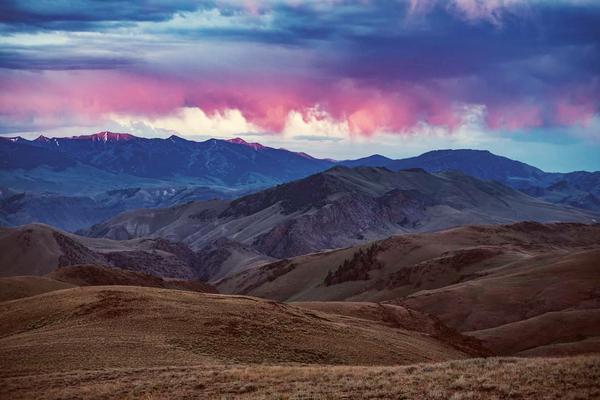
And here’s to you, our friends, dear readers, for staying with us, and partnering with us on the land for another year with your orders of Alderspring protein, and through your moral support by emails, notes and letters. We so appreciate every order, and every kind word. You are the best partners a guy could imagine. Happy New Year to you all; may your 2019 be blessed in all ways for you and yours.
There’s an old Irish verse you may have heard that I have adapted slightly for those who run cattle in open spaces as we do; I’ll pass it on as a New Year’s blessing to you all. No matter what your walk, and whether the words be literal or metaphoric, we all have in front of us a steady stream of adversity, and it is truly a relief when things go well and just right. It is, indeed, a blessing.
May the trail rise up to meet you.
May the wind always be at your back.
May the sun shine warm upon your face,
and rains fall soft upon your ranges.
Happy Trails, friends.
Glenn, Caryl, Girls (there’s two granddaughters now, by the way), Ethan, and Josh at Alderspring Ranch.
